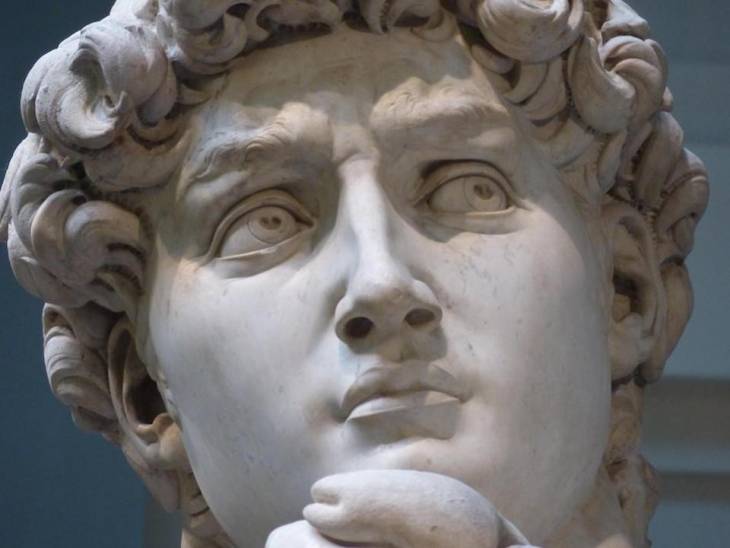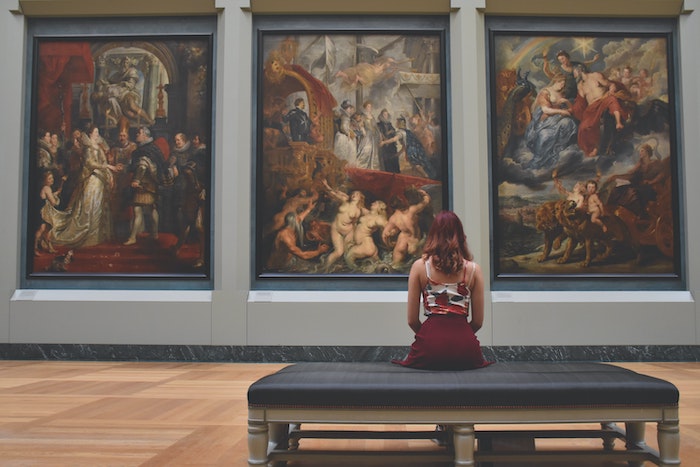The Importance of Studying Arts

Statue of David by Michelangelo Buenarroti. © Jan Halaska / Alamy Stock Photo
In the past, people believed that education in science, technology, and mathematics was the only way to achieve success. Everyone wanted their children to become scientists, engineers, and doctors.
While that is all well and good, we are living in the 21st century and things are no longer as they were. Students today can pursue degrees in arts, humanities, social sciences, or history. These fields also present whorthwhile career opportunities and hold great importance in modern society.
In today’s world, there is a growing need for well-rounded knowledge fields rather than limiting it to science and technology only. Modern science and technology needs highly creative and innovative solutions more than ever before.
Studying arts is about broadening minds for creative thinking, exploration, artistic expressions, and making sense of everyday life. It's about feeding the soul and quenching our inner yearnings for self-expression and knowledge of different art forms - be it visual, literary, performing, or culinary arts.
Unlike technical skills that can be acquired within a short period, soft skills such as those acquired in the arts are developed over time, including critical thinking, complex analysis, social empathy, creativity, imagination, ingenuity, communication, and problem solving skills.
Unsurprisingly, employers are increasingly looking for individuals with sufficient soft skills, artistic tendencies, and abilities to pursue tasks creatively, communicate effectively through innovative means, and arouse people's emotional responses. Those skills are highly valued in the labor market.
Embracing the arts is, therefore, essential for a wholesome human experience, entailing creative exploration and expression. But that's not all that studying the arts offers.
Benefits of Studying Arts

Let's explore more benefits of studying arts and understand the value this field holds:
1. Sharpens Intellectual Skills
People at times question ‘the value of art education’ and how it promotes learning amongst students. Believe it or not, students develop skills like resilience and courage, growing their mindsets while helping them see the world through a broader perspective.
Teachers and mentors are likely to set goals for students and evaluate performance by linking results with the work done. The feedback works as an intrinsic motivator for students, which elevates their extrinsic motivation for doing better.
Similarly, young children holding a paintbrush or using an instrument are likely to develop motor skills, giving them strength and confidence. After all, every school includes art subjects in their curriculum because they know it is a fantastic way to grow children’s creative minds.
2. Provides Wholesome Learning
Education stakeholders and systems today are looking into changing from stem to steam; the inclusion of the ‘A’ component indicates arts. Educationalists have identified the importance of creative skills, which can only be polished through art education.
Art covers a broad category of subjects – you can learn music, psychology, humanities, anything you are passionate about. Even researches disclosed how learning art in the form of music or theatre enhances verbal memory, pronunciation, communication, and executive functions.
Opening doors to arts education is drawing students to more complex and wholesome endeavors, because art combines all subjects. For instance, if a student is studying music and learns to play an instrument, the student must at least have a basic scientific understanding of how sound waves are created. Therefore, ‘steam’ is helping students deliver learned concepts while applying them practically. It strengthens cognition since art tests students thinking capabilities.
3. Supports Exploding Opportunities for Designers & Artists
Some people have a perception that art education does not lead to great job opportunities. Well, that is not completely true for many people in artistic fields.
In the 21st century, everything is about digitalization. Almost every business is trying their luck with online platforms to promote their services.
People are actively using the internet to watch videos, socialize, enjoy great website designs, and seek information. This has become possible with the help of professionals in art fields, including multimedia artists, web designers, graphic designers, and illustrators.
Similarly, in the coming years, the demand for artists is likely to increase significantly because of more innovations in mobile and digital solutions. Therefore, studying art is an essential way to keep up with growing opportunities in today’s modern world.

4. Improves Performance in Other Subjects/Fields
Education systems are moving towards the concept of ‘steam’ – science, technology, engineering, arts, mathematics. These might be different subjects, but art enjoys a component of every subject. Drawing a painting on canvas requires measurements, proportionate thinking, and number measurement, fostering mathematics thinking.
Similarly, if someone is learning dance forms, they work with dimensional patterns and spatial relationships. So, don’t you think it is vital to study art? There is a need for creative brains with ideas and thinking capacities to progress in the technological world.
Art classes develop a unique set of skills – persistence, observing, and making connections between schoolwork and the outside world. Hence, bolstering academic performance.
5. Promotes Creativity and Innovation
Undoubtfully, art can inspire deeper meaning, allowing students to think. It teaches some remarkable life lessons by allowing students to imagine, aspire, and dream. It encourages students to think out of the box and come up with innovative ideas.
Students get a chance to utilize their skills efficiently and establish themselves as competent individuals. There is nothing more powerful than having a clear perspective on life. After all, people with a potent mindset are likely to climb the stairs of success.
6. Bolsters Teamwork and Leadership
Art education is preparing students for professional lives. They learn how it is like to be an active member of the community and work with others to achieve the same goals.
By working together, they understand the different and diverse mindsets of their team members. It builds acceptance by breaking judgmental barriers because students work with people from different backgrounds.
Students also get a chance to offer and receive criticism on their work, helping them get better. Alongside this, students are likely to develop leadership skills since they have to make decisions, develop strategies, and plan things.
At the same time, by using these skills, they create a strong sense of identity and confidence in their ability to change the world around them. Therefore, it would be right to say that ‘steam’ education systems are building leaders, not followers.
7. Art Makes You Happier
Art programs begin with observation of the real world. Where one creates a visual response to the surroundings, notices things around, and starts questioning. This allows students to view things from a vastly different perspective.
Moreover, observing or creating any form of art reduces stress, your body releases endorphins, which helps you enjoy a sense of fulfillment.
An artist knows the enticing feeling of smearing a pencil and paint on a piece of paper. They enjoy communicating with colors and shapes, enhancing their imagination.
You might not know how studying art makes you feel until you give it a shot. It turns people into more positive and well-rounded human beings while promoting better self-understanding.
In Conclusion: Studying Arts Is Very Beneficial
With the changing times, people need to acknowledge the importance of studying arts. Arts education holds great value. A finance degree is valuable, but it can fail to build critical soft skills and empathy. In this technological era, there's a real need for well-rounded education – ‘steam’ for producing an innovative, wholesome, and creative workforce.
Art education makes students more proficient by equipping them with wholesome knowledge and skills. If you are still skeptical about the importance of studying art, consider all of the possibilities thinking creatively opens to see why studying art is vital.












![Over 50% of American Adults Have Not Read a Book in Past Year [Study]](/sites/default/files/styles/video_thumbnail_bottom/public/older-man-reading-book-in-library.jpg?itok=m7DlbWgZ)







